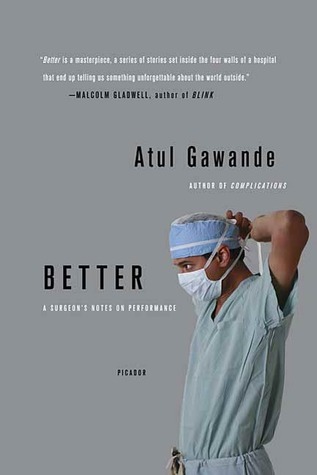More on this book
Community
Kindle Notes & Highlights
Betterment is a perpetual labor. The world is chaotic, disorganized, and vexing, and medicine is nowhere spared that reality. To complicate matters, we in medicine are also only humans ourselves. We are distractible, weak, and given to our own concerns. Yet still, to live as a doctor is to live so that one’s life is bound up in others’ and in science and in the messy, complicated connection between the two. It is to live a life of responsibility. The question, then, is not whether one accepts the responsibility. Just by doing this work, one has. The question is, having accepted the
...more
We always hope for the easy fix: the one simple change that will erase a problem in a stroke. But few things in life work this way. Instead, success requires making a hundred small steps go right—one after the other, no slipups, no goofs, everyone pitching in. We are used to thinking of doctoring as a solitary, intellectual task. But making medicine go right is less often like making a difficult diagnosis than like making sure everyone washes their hands.
(“Trust no one” is the mantra we all learn to live by in surgical training.)
We have never faced having to rehabilitate people with such extensive wounds. We are only beginning to learn what to do to make a life worth living possible for them.
IT IS UNSETTLING to find how little it takes to defeat success in medicine. You come as a professional equipped with expertise and technology. You do not imagine that a mere matter of etiquette could foil you. But the social dimension turns out to be as essential as the scientific—matters of how casual you should be, how formal, how reticent, how forthright. Also: how apologetic, how self-confident, how money-minded. In this work against sickness, we begin not with genetic or cellular interactions, but with human ones. They are what make medicine so complex and fascinating. How each
...more
To become a doctor, you spend so much time in the tunnels of preparation—head down, trying not to screw up, just going from one day to the next—that it is a shock to find yourself at the other end, with someone shaking your hand and offering you a job. But the day comes.
I prescribe somewhere around thirty thousand dollars’ worth of medical care—in the form of specialist consultations, surgical procedures, hospital stays, X-ray imaging, and medicines. And how well these services are reimbursed inevitably affects how lavish I can be in dispensing them. This is where money-mindedness becomes inescapable—and likewise the struggle between doing right and doing well.
Our earnings are more than seven times those of the average American employee, and that gap has grown over time. (In most industrialized countries, the ratio is under three.) This has allowed American medicine to attract enormous talent to its ranks and kept doctors willing to work harder than members of almost any other profession. At the same time, we as a country have shown little concern for the uninsured. One
There are vital but sometimes murky differences between acting skillfully, acting lawfully, and acting ethically.
The seemingly easiest and most sensible rule for a doctor to follow is: Always Fight. Always look for what more you could do. I am sympathetic to this rule. It gives us our best chance of avoiding the worst error of all—giving up on someone we could have helped.
Good doctors, she finally said, understand one key thing: “This is not about them. It’s about the patient.” The good doctors didn’t always get the answers right, she said. Sometimes they still pushed too long or not long enough. But at least they stopped to wonder, to reconsider the path they were on. They asked colleagues for another perspective. They set aside their egos.
We in medicine are not the only ones being graded nowadays. Firefighters, CEOs, and salesmen are. Even teachers are being graded, and, in some places, being paid accordingly. Yet we all feel uneasy about being judged by such grades. They never seem to measure the right things. They don’t take into account circumstances beyond our control. They are misused; they are unfair. Still, the simple facts remain: there is a bell curve in all human activities, and the differences you measure usually matter.


